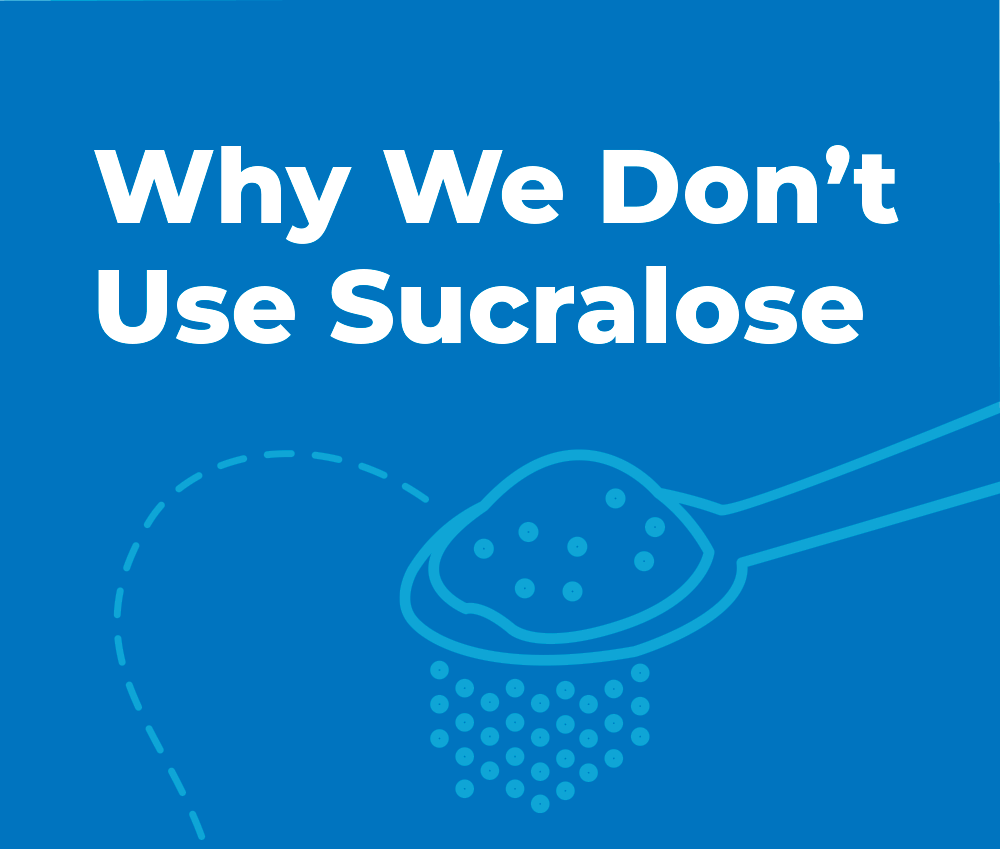
Why We Say No To Sucralose (And Why You Should, Too)
Share
In a world that's becoming increasingly health-conscious, many people are opting for low-calorie and sugar-free alternatives to their favorite foods and drinks. One popular sugar substitute that's used globally in diet foods and beverages (never Pureboost don’t worry!) is sucralose. However, the health profile of sucralose has raised concerns among researchers, and the many sucralose side effects and dangers cannot be ignored.
What is Sucralose?
Sucralose is a zero-calorie artificial sweetener that is commonly used in reduced-calorie and diet foods and beverages. It is derived from sugar and contains chlorine, which is added to intensify its sweetness. While it was originally developed as an insecticide (gross), sucralose was later introduced as a sugar substitute to the masses, and the dangers of the compound were unknown.
Why is Sucralose so Popular?
Sucralose's popularity comes from its ability to easily dissolve in both fat-based and water-based liquids, including alcoholic beverages and energy drinks. Other artificial sweeteners like aspartame and sodium saccharin don’t dissolve as easily, making their product applications limited.
Side Effects and Dangers:
Despite its popularity, there are some significant reasons why you should avoid sucralose and opt for natural sweeteners instead (like we do for all of our Pureboost products), including:

May Cause Diabetes
Sucralose has been linked to an increased risk of developing diabetes. According to a study published in the journal Diabetes Care, people who drank diet soda every day had a 36% greater risk of metabolic syndrome and a 67% greater risk of type 2 diabetes. The researchers found that sucralose made it harder for the body to absorb glucose, which is the main source of energy for cells, and caused blood sugar levels to spike. Another study published in Cell Metabolism in 2020 found that consuming sucralose with carbohydrates made it even harder for the body to process glucose.

Increases Risk of Irritable Bowel Syndrome and Crohn’s Disease
Sucralose consumption has been linked to an increase in irritable bowel syndrome (IBS) and Crohn's disease. A study conducted by Xin Qin, M.D., Ph.D, from New Jersey Medical School found that consuming sucralose causes IBS symptoms, ulcerative colitis, and Crohn's disease. Dr. Qin made this discovery when examining the rapid increase of IBS among Alberta, Canada residents over a 20-year period. In short, it went up 643% (yikes).

Other Health Risks
Sucralose has also been linked to other health concerns such as:
Migraines and headaches
Allergic reactions
Increased appetite and weight gain
Damage to gut health
Disruption of the body's ability to regulate blood sugar levels
Natural Sweeteners: A Better Alternative
Given the potential health risks associated with consuming sucralose and other artificial sweeteners, it's no wonder that many people are turning to natural sweeteners as a healthier alternative. Two of the most popular natural sweeteners, that we also use to sweeten Pureboost, are Stevia and Erythritol.
Stevia is a plant-based sweetener that is derived from the leaves of the Stevia rebaudiana plant. It has been used for centuries in South America as a natural sweetener and is now widely available in the United States and other countries. Stevia is much sweeter than sugar but has zero calories and does not raise blood sugar levels.
Erythritol is a sugar alcohol that is naturally found in certain fruits and fermented foods. It has a sweet taste but contains only about 6% of the calories of sugar and does not raise blood sugar levels either. Erythritol is often used in low-carb and keto-friendly recipes as a sugar substitute.
Conclusion
While sucralose is a widely used artificial sweetener that can be found in many foods and beverages, it comes with some serious health risks. Research has linked sucralose consumption to an increased risk of diabetes, IBS, migraines, and an imbalance in the gut microbiome just to name a few. In contrast, natural sweeteners like those that we use in Pureboost (shoutout to Stevia and Erythritol) offer a better alternative that can be used to sweeten your favorite foods and drinks without all the negative effects. When we say we’re a “clean” energy drink, we mean it in more ways than one!
source: https://www.timesofisrael.com/sweeteners-hurt-the-ability-of-gut-bacteria-to-keep-us-well-israeli-study/amp/